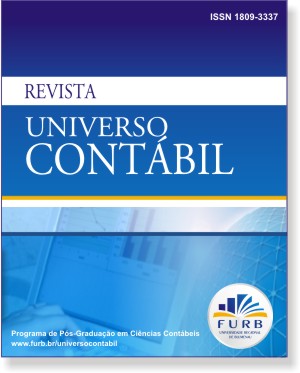EM BUSCA DA LEGITIMIDADE SOCIAL: RELAÇÃO ENTRE O IMPACTO AMBIENTAL DA ATIVIDADE ECONÔMICA DAS EMPRESAS BRASILEIRAS E OS INVESTIMENTOS NO MEIO AMBIENTE
DOI:
https://doi.org/10.4270/ruc.20117Palavras-chave:
Responsabilidade Social. Legitimidade Social. Investimento Ambiental.Resumo
Para atingir a legitimidade social, é possível que as empresas adotem certos procedimentos, não porque acreditem na eficiência deles, mas porque a sociedade entende que tais mecanismos são eficazes e, por isso, impõe-lhes o dever de observá-los. Mais especificamente no que diz respeito ao meio ambiente, empresas poderiam estar realizando investimentos não por estarem efetivamente preocupadas com sua preservação, mas sim por necessitarem, de certa forma, legitimar sua posição no meio em que estão inseridas. Dentro desse contexto, este estudo objetiva analisar a relação entre o impacto ambiental decorrente da atividade econômica e o volume de investimentos no meio ambiente das empresas brasileiras. A amostra compõe-se das 205 empresas que apresentaram o Balanço Social nos anos de 2005, 2006 e 2007. Essas empresas foram classificadas pelo potencial de poluição e o grau de utilização de recursos naturais, de acordo com a Lei nº 10.165/2000, que dispõe sobre a Política Nacional do Meio Ambiente. Para atingir o objetivo estabelecido, utilizaram-se as técnicas Qui-quadrado e Análise de Correspondência (ANACOR). O teste Qui-quadrado confirmou a relação entre o impacto ambiental potencial e os investimentos ambientais. Do mesmo modo, a ANACOR evidenciou que as empresas cuja atividade não causam impacto ambiental estão mais propensas a realizarem baixos investimentos ambientais. Por outro lado, empresas de alto e pequeno/médio impacto ambiental estão mais predispostas a realizarem altos e moderados investimentos ambientais, corroborando com a teoria da legitimação, onde os investimentos são uma estratégia para buscar legitimação social.
Downloads
Downloads
Publicado
Como Citar
Edição
Seção
Licença
Os direitos autorais para artigos publicados nesta revista são do autor, com direitos de primeira publicação para a revista. Em virtude de aparecerem nesta revista de acesso público, os artigos são de uso gratuito, com atribuições próprias, em aplicações educacionais e não-comerciais. A revista permitirá o uso dos trabalhos publicados para fins não-comerciais, incluindo direito de enviar o trabalho para bases de dados de acesso público. Os artigos publicados são de total e exclusiva responsabilidade dos autores.
• O(s) autor(es) autoriza(m) a publicação do artigo na revista;
• O(s) autor(es) garante(m) que a contribuição é original e inédita e que não está em processo de avaliação em outra(s) revista(s);
• A revista não se responsabiliza pelas opiniões, ideias e conceitos emitidos nos textos, por serem de inteira responsabilidade de seu(s) autor(es);
• É reservado aos editores o direito de proceder ajustes textuais e de adequação do artigo às normas da publicação;
• O(s) autor(es) declaram que o artigo não possui conflitos de interesse.


